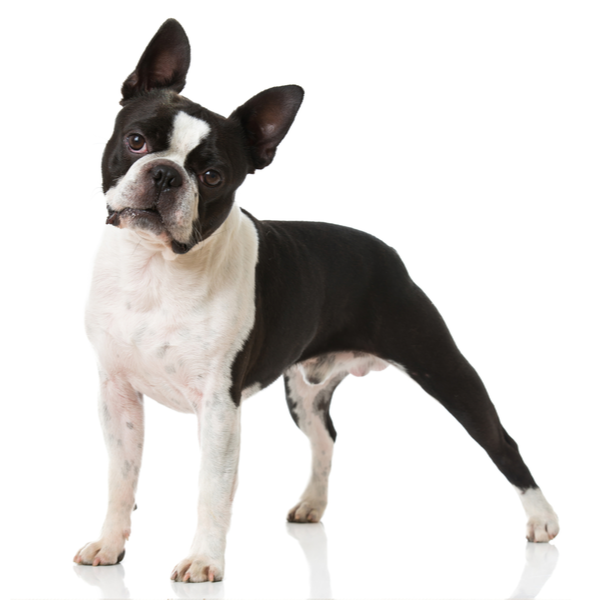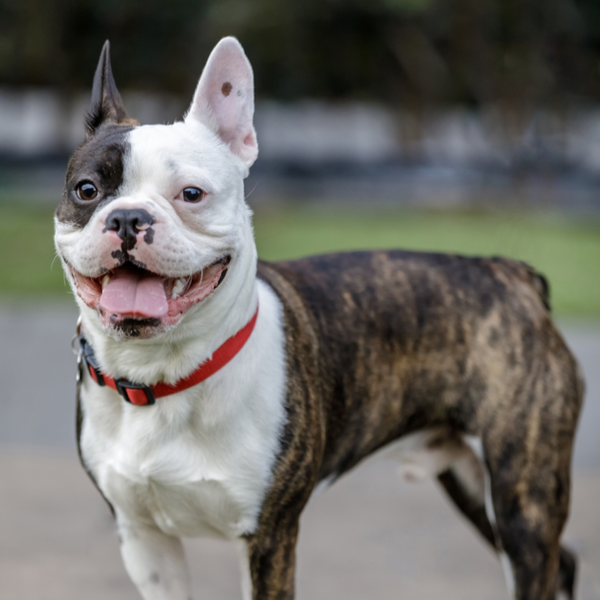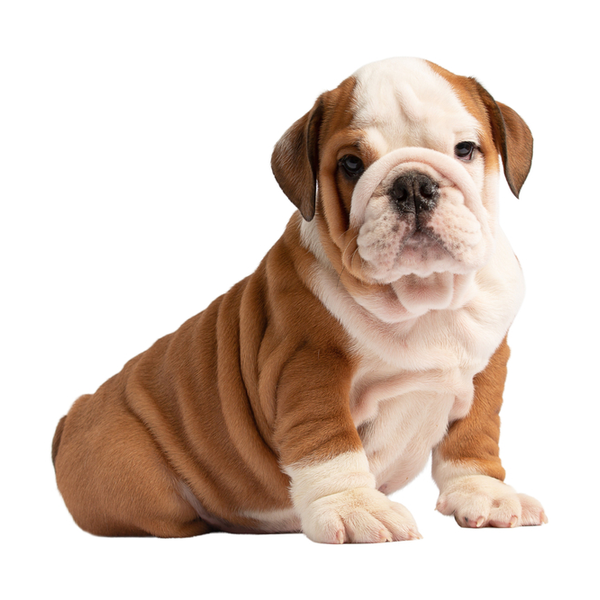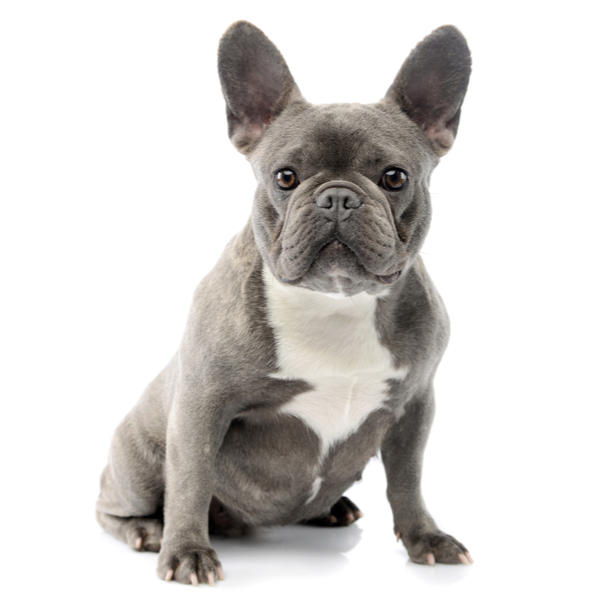
BOSTON TERRIER PUPPIES FOR SALE
Energetic. Gentle.
Sometimes called the Boston Bull or Boston Bull Terrier, the Boston Terrier is an American breed that originated in 1870 and was created by crossing a white English Terrier with an English Bulldog. Surprisingly, they were bred for pit-fighting. Their gentle disposition today has earned them the nickname “American Gentleman.” Compact, muscular, and attractive, Boston Terriers are also friendly, gentle, and intelligent. They can be rambunctious and will need regular exercise to burn some energy and keep them healthy.
Their small size and short coats make them ill-suited to extreme temperatures. At Happytail Puppies, we emphasize the well-being and health of our puppies to ensure they get the best care and attention from birth until they find their forever homes. Our Boston Terrier Puppies are raised in a loving environment, socialized from an early age, and arrive with the necessary health checks and vaccinations, offering you peace of mind.

Temperament
This breed is adaptable and can easily live in any size of home environment. They don’t bark much, so they can be good candidates for smaller dwellings provided that daily exercise is prioritized.
Boston Terriers can be protective of their people, and the tendency may result in aggression toward strangers and other animals. Early training and socialization should be relatively easy due to their intelligence, and it can help you curb this instinctive behavior.

Appearance
Their bodies are square-like and short with a low-set tail that is straight or sometimes screw-shaped. The chest is broad and the neck slightly arched. They have muscular legs set wide that are reminiscent of a small tank.
They have short, smooth coats that come in several colors:
- Black and white
- Seal and white
- Brindle and white
Boston Terriers stand about 15 to 17 inches tall and typically weigh between 10 and 25 pounds.

Exercise
They do not tolerate heat or extremely cold weather.
Boston Terriers are brachycephalic, meaning that the breed has a broad, short skull. Because these breeds are prone to respiratory problems, they need to be walked with a harness instead of a collar around the neck to prevent injury. Their short muzzles also cause drooling, snorting, and loud snoring.
We recommend about 60 minutes of activity a day and about 8 miles of walking a week.
A Glimpse into the Past of Boston Terrier Puppies
The Boston Terrier's journey began in the late 19th century when it emerged from a mix of the English Bulldog and the White English Terrier.
• Origin
Boston Terriers were named for their home city of Boston. They originated around 1870 when the English Terrier-owning Robert C. Hooper purchased a Bulldog from Edward Burnett. The dogs had a litter, and their offspring were interbred with French Bulldogs, which is what led to the Boston Terrier. The breed was larger and heavier in its early days, weighing up to 44 pounds. Knowing how gentle and loving today’s Boston Terriers can be, it’s almost shocking to know they were used in pit-fighting. The breed had become very popular in Boston by 1889. They were admitted into the American Kennel Club in 1893. Boston Terriers became the first non-sporting breed to be bred in the United States.
• Rise To Prominence
During World War I, the 102nd Infantry Regiment named a Boston Terrier as its official mascot. His name was Sergeant Stubby, and he served for 18 months in 17 battles. He warned his unit of gas attacks, found wounded soldiers, and was even said to have caught a German spy. They promoted Stubby to sergeant for his loyalty and bravery in the field of combat. He was smuggled back into the United States when the war ended, and he met Presidents Woodrow Wilson, Calvin Coolidge, and Warren G. Harding. (President Harding (and later President Gerald Ford) were Boston Terrier owners. In 1922, Boston University made the dog its official mascot, and in 1979, Boston Terriers became the state dog of Massachusetts.
Common Health Concerns of Boston Terrier Puppy
Like the other breeds, Boston Terriers have distinctive health considerations that the owners should know about to ensure a happy and healthier life for their furry friends.
Major Health Concerns
- Patellar Luxation: This condition involves the dislocation of the kneecap and can cause discomfort and lameness.
- Cherry Eye: A prolapse of the gland of the third eyelid, leading to a visible red mass in the corner of the eye.
- Allergies: Boston Terriers can be prone to various allergies, including food and environmental allergies, which may manifest in skin irritation and itching.
- Brachycephalic Syndrome: Due to their short muzzle, Boston Terriers may suffer from respiratory issues, overheating, and difficulty regulating body temperature.
Minor Health Concerns
- Cataracts: While not exclusive to Boston Terriers, cataracts can develop and cause vision impairment if left untreated.
- Corneal Ulcer: Boston Terriers' prominent eyes make them susceptible to corneal ulcers, which are often caused by trauma or foreign objects.
Caring For Boston Terrier Puppies
Boston Terriers are charming companions with less grooming needs; however, they need some regular maintenance to ensure their well-being and health.
• Coat Care
Boston Terriers are easy to groom with their smooth fur and low shed rate. Weekly combing can help manage their shedding, while baths should be given as required. Pay better attention to their faces by using a damp cloth to clean their eyes and creases daily, preventing infections and staining.
• Ear, Teeth, and Nail Care
To keep your Boston Terrier healthy and comfortable, regularly clean its ears, brush its teeth weekly, and trim its nails monthly. Your veterinarian can demonstrate proper techniques to ensure you care for it safely.
• Dietary Considerations
Boston Terriers can be sensitive to certain foods, so feed them a high-quality diet rich in animal protein and low in grains to avoid allergies and flatulence. Monitor their caloric intake to prevent obesity, which can exacerbate their brachycephalic syndrome symptoms.
• Training and Housebreaking
To train your Boston Terriers, you need to know about the positive reinforcement techniques we offer in our streamlined training programs. We recommend crate training as a helpful tool, as it may take longer to housetrain them.
FREQUENTLY ASKED QUESTIONS ABOUT BOSTON TERRIER
Is a Boston Terrier a Good Family Dog?
Boston Terriers are the best as family pets. They are friendly and affectionate with children. Their energetic and playful nature makes them the perfect companions. They are extremely adaptable to varied living conditions are are easily taken care of, making them the ideal choice for families.
What Should I Feed My Boston Terrier Puppy?
You can feed your Boston Terrier puppy, well-balanced top-quality puppy food formulated specifically for the smaller breeds. Search for food rich in healthy fats, proteins, vitamins, and minerals. It is essential to follow every feeding guideline on the food package while consulting with the vets for the specific dietary recommendations streamlined to meet the needs of your puppy.
Are Boston Terrier Puppies Hypoallergenic?
Boston Terrier Pups are not hypoallergenic. They have shorter coats, and they shed, triggering allergies among sensitive people. Regular grooming can help in minimizing shedding while reducing allergens. If you or your family members have allergies, then spending time with a Boston Terrier before adoption is the best option to find any allergic reactions.
Are Boston Terrier Puppies Easy to Train?
Boston Terrier puppies are easily trained. They are always eager to please and are intelligent helping them in learning commands and behaviors. Positive reinforcement methods work best with them. Consistent socialization and training as we offer through our personalized training programs at a younger age, are essential to ensure that they develop into well-mannered adult dogs.
Do Boston Terrier Puppies Get Along with Other Pets?
Boston Terrier Puppies get along well with other pets, mainly when they socialize early. They are friendly dogs who enjoy companionship. But their temperaments vary, so gradual socialization and supervised introductions are the key to ensuring harmonious interactions with other pets.




